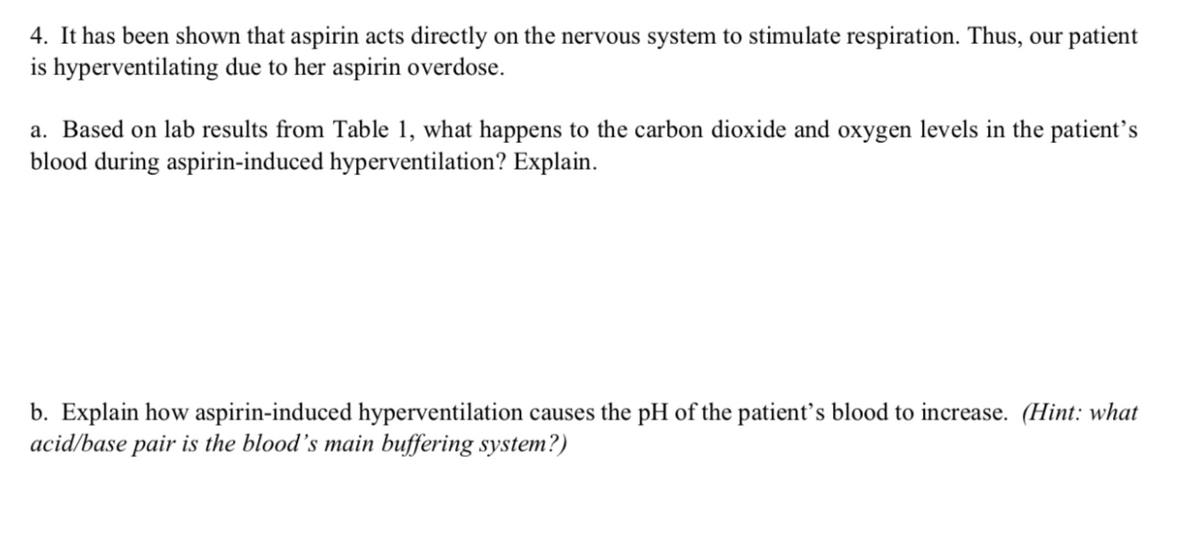Table 1: Arterial blood gas concentration in patient Two hours after aspirin ingestion Ten hours after aspirin ingestion Normal values Partial Pressure CO2 26 mm Hg 19 mm Hg 35-45 mm Hg Partial Pressure O2 113 mm Hg 143 mm Hg 75-100 mm Hg Bicarbonate [HCO;] 18 mM 21 mM 22-26 mM pH 7.44 7.55 7.35-7.45 Blood salicylate concentration, mg/dL 57 117 4. It has been shown that aspirin acts directly on the nervous system to stimulate respiration. Thus, our patient is hyperventilating due to her aspirin overdose. a. Based on lab results from Table 1, what happens to the carbon dioxide and oxygen levels in the patient's blood during aspirin-induced hyperventilation? Explain. b. Explain how aspirin-induced hyperventilation causes the pH of the patient's blood to increase. (Hint: what acid/base pair is the blood's main buffering system?)
Table 1: Arterial blood gas concentration in patient Two hours after aspirin ingestion Ten hours after aspirin ingestion Normal values Partial Pressure CO2 26 mm Hg 19 mm Hg 35-45 mm Hg Partial Pressure O2 113 mm Hg 143 mm Hg 75-100 mm Hg Bicarbonate [HCO;] 18 mM 21 mM 22-26 mM pH 7.44 7.55 7.35-7.45 Blood salicylate concentration, mg/dL 57 117 4. It has been shown that aspirin acts directly on the nervous system to stimulate respiration. Thus, our patient is hyperventilating due to her aspirin overdose. a. Based on lab results from Table 1, what happens to the carbon dioxide and oxygen levels in the patient's blood during aspirin-induced hyperventilation? Explain. b. Explain how aspirin-induced hyperventilation causes the pH of the patient's blood to increase. (Hint: what acid/base pair is the blood's main buffering system?)
Cardiopulmonary Anatomy & Physiology
7th Edition
ISBN:9781337794909
Author:Des Jardins, Terry.
Publisher:Des Jardins, Terry.
Chapter4: The Diffusion Of Pulmonary Gases
Section: Chapter Questions
Problem 1RQ
Related questions
Question
![Table 1: Arterial blood gas concentration in patient
Two hours after aspirin
ingestion
Ten hours after aspirin
ingestion
Normal values
Partial Pressure CO2
26 mm Hg
19 mm Hg
35-45 mm Hg
Partial Pressure O2
113 mm Hg
143 mm Hg
75-100 mm Hg
Bicarbonate [HCO;]
18 mM
21 mM
22-26 mM
pH
7.44
7.55
7.35-7.45
Blood salicylate
concentration, mg/dL
57
117](/v2/_next/image?url=https%3A%2F%2Fcontent.bartleby.com%2Fqna-images%2Fquestion%2Ff81cd158-9f28-4b1f-ae17-04c733636b15%2F130e353b-89e3-4758-904b-47028e30de4c%2Fdfe0cni_processed.png&w=3840&q=75)
Transcribed Image Text:Table 1: Arterial blood gas concentration in patient
Two hours after aspirin
ingestion
Ten hours after aspirin
ingestion
Normal values
Partial Pressure CO2
26 mm Hg
19 mm Hg
35-45 mm Hg
Partial Pressure O2
113 mm Hg
143 mm Hg
75-100 mm Hg
Bicarbonate [HCO;]
18 mM
21 mM
22-26 mM
pH
7.44
7.55
7.35-7.45
Blood salicylate
concentration, mg/dL
57
117

Transcribed Image Text:4. It has been shown that aspirin acts directly on the nervous system to stimulate respiration. Thus, our patient
is hyperventilating due to her aspirin overdose.
a. Based on lab results from Table 1, what happens to the carbon dioxide and oxygen levels in the patient's
blood during aspirin-induced hyperventilation? Explain.
b. Explain how aspirin-induced hyperventilation causes the pH of the patient's blood to increase. (Hint: what
acid/base pair is the blood's main buffering system?)
Expert Solution
This question has been solved!
Explore an expertly crafted, step-by-step solution for a thorough understanding of key concepts.
This is a popular solution!
Trending now
This is a popular solution!
Step by step
Solved in 2 steps

Recommended textbooks for you

Cardiopulmonary Anatomy & Physiology
Biology
ISBN:
9781337794909
Author:
Des Jardins, Terry.
Publisher:
Cengage Learning,

Human Physiology: From Cells to Systems (MindTap …
Biology
ISBN:
9781285866932
Author:
Lauralee Sherwood
Publisher:
Cengage Learning


Cardiopulmonary Anatomy & Physiology
Biology
ISBN:
9781337794909
Author:
Des Jardins, Terry.
Publisher:
Cengage Learning,

Human Physiology: From Cells to Systems (MindTap …
Biology
ISBN:
9781285866932
Author:
Lauralee Sherwood
Publisher:
Cengage Learning


Basic Clinical Lab Competencies for Respiratory C…
Nursing
ISBN:
9781285244662
Author:
White
Publisher:
Cengage

Anatomy & Physiology
Biology
ISBN:
9781938168130
Author:
Kelly A. Young, James A. Wise, Peter DeSaix, Dean H. Kruse, Brandon Poe, Eddie Johnson, Jody E. Johnson, Oksana Korol, J. Gordon Betts, Mark Womble
Publisher:
OpenStax College

Case Studies In Health Information Management
Biology
ISBN:
9781337676908
Author:
SCHNERING
Publisher:
Cengage